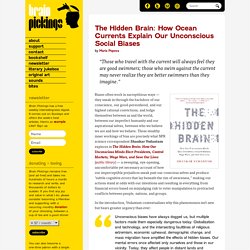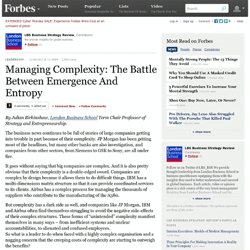

Why autocratic bosses are a dying breed. The idea that everyone wants leadership and wants to be led is a popular one, especially among corporate CEOs, but how true is it? Recent political events in Ukraine and Thailand should focus business leaders' minds on this question and start them rethinking their own role and their relationship with their followers. The myth that everyone wants to be led is an old one, and like many myths, there is not a lot of solid foundation to it. Leaders like to believe it, of course, and why not? If it were true that our followers really want to follow us, that they look to us for a lead and will do nothing without our say-so, then life at the top becomes much easier. All we would have to do is give orders, and the masses would rush to obey them. Until very recently, this was the perceived wisdom about leadership circles. Click to enlarge Many business leaders succumbed to at least parts of this myth.
Power games Get humble. Redefining Leadership: Lara Toensmann at TEDxReset 2014. What Leaders Really Do - HBR. The article reprinted here stands on its own, of course, but it can also be seen as a crucial contribution to a debate that began in 1977, when Harvard Business School professor Abraham Zaleznik published an HBR article with the deceptively mild title “Managers and Leaders: Are They Different?”

The piece caused an uproar in business schools. It argued that the theoreticians of scientific management, with their organizational diagrams and time-and-motion studies, were missing half the picture—the half filled with inspiration, vision, and the full spectrum of human drives and desires. The study of leadership hasn’t been the same since. “What Leaders Really Do,” first published in 1990, deepens and extends the insights of the 1977 article. Leadership is different from management, but not for the reasons most people think. Atul Gawande: How do we heal medicine? P/wp-content/uploads/2013/09/Scientific-and-Medical-Network-Review-Article.pdf. The Hidden Brain: How Ocean Currents Explain Our Unconscious Social Biases. By Maria Popova “Those who travel with the current will always feel they are good swimmers; those who swim against the current may never realize they are better swimmers than they imagine.”

Biases often work in surreptitious ways — they sneak in through the backdoor of our conscience, our good-personhood, and our highest rational convictions, and lodge themselves between us and the world, between our imperfect humanity and our aspirational selves, between who we believe we are and how we behave. In the introduction, Vedantam contextualizes why this phenomenon isn’t new but bears greater urgency than ever: Unconscious biases have always dogged us, but multiple factors made them especially dangerous today. Globalization and technology, and the intersecting faultlines of religious extremism, economic upheaval, demographic change, and mass migration have amplified the effects of hidden biases. Illustration from the 1970 book 'I’m Glad I’m a Boy! Vedantam writes: Donating = Loving Share on Tumblr. David Foster Wallace on Leadership, Illustrated and Read by Debbie Millman.
By Maria Popova “A leader’s real ‘authority’ is a power you voluntarily give him, and you grant him this authority not with resentment or resignation but happily.”

“Leadership” is one of those buzzwords — like “curation” — whose meaning has been forcibly squeezed out of them by regurgitative overuse and relentless overapplication to things that increasingly dilute the essence of the concept the word once used to capture. In a culture that calls pop culture celebrities “thought-leaders” and looks for “leadership ability” in kindergartners, we’re left wondering what leadership actually means and questioning what makes a great leader.
The best definition of the essence beneath the buzzword comes from David Foster Wallace, who would’ve been 52 this week and who, even amidst heartbreaking and ultimately fatal personal turmoil, was able to distill the meaning of life with crystalline poignancy. Get the print here. Donating = Loving Brain Pickings has a free weekly newsletter.
Share on Tumblr. Managing Complexity: The Battle Between Emergence And Entropy. By Julian Birkinshaw, London Business School Term Chair Professor of Strategy and Entrepreneurship.

The business news continues to be full of stories of large companies getting into trouble in part because of their complexity. JP Morgan has been getting most of the headlines, but many other banks are also investigation, and companies from other sectors, from Siemens to GSK to Sony, are all under fire. It goes without saying that big companies are complex. And it is also pretty obvious that their complexity is a double-edged sword. Companies are complex by design because it allows them to do difficult things. Why Australian workplaces need much better leaders. Over the last decade, Australia has experienced a productivity slump. Our long term productivity growth ranks well below the OECD average, and significantly below that enjoyed by leading economies. However, the reality of falling productivity and its consequences has been masked for most ordinary Australians by the mining boom, which has created created jobs and driven wages up. A number of international studies have suggested that in many workplaces, the quality of leadership and management skills can have significant direct effects on productivity, as well as indirect effects through their consequences for how workplaces adapt and to changing business conditions and innovate.
A similar picture is now emerging Australia. This gap is evident in official data on the ability of Australian business to introduce technological innovations, new products or services, or new management systems or organisational innovations. Are Australians bad managers? Meeting new business challenges.